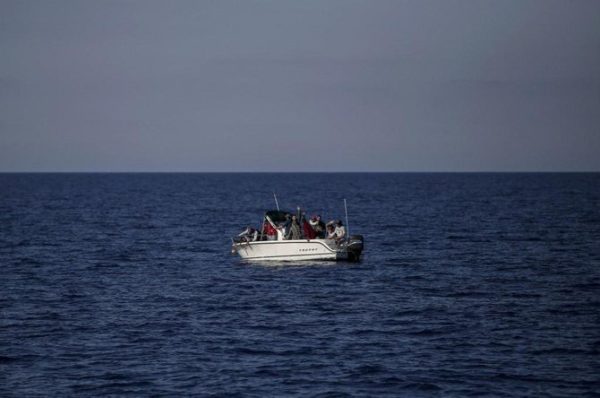BY Nada Homsi
The Lebanese army said on Wednesday that it remains committed to preventing illegal sea migration, despite recent proposals by Lebanon’s officials that Syrian refugees be permitted to leave for Europe by sea.
“The Lebanese army’s policy follows the orders of the Council of Ministers,” said an army official on condition of anonymity.
“Right now we remain charged with protecting the sea border and preventing illegal migration.”
The army official was responding to comments by the caretaker Minister of the Displaced, Issam Charaffadine, who on Tuesday called on Lebanon to “open the sea for migration” for Syrians to attempt the perilous crossing to the EU.
Figures compiled by the UN’s International Organisation for Migration show 28,000 migrants have died trying to cross the Mediterranean since 2014.
“The sea is ahead of you and Syria is behind you,” Charafeddine told local media outlet L’Orient Today, apparently addressing Syrians in Lebanon.
It was an endorsement of Hezbollah leader Hassan Nasrallah’s controversial comments encouraging sea migration for Syrians in Lebanon, which he said could be used as leverage in dealing with Europe and the US.
But the army official dismissed the idea that the government would formally permit mass departures by sea, saying such a decision would be “difficult to execute.”
“Despite Minister Charafadine’s comments – it’s not his decision to make,” the official added.
Syria crisis
Government estimates put the number of Syrians in Lebanon at about two million.
For years, Lebanon’s politicians have blamed many of the country’s ills on Syrian refugees.
Millions of Syrians fled their country following the eruption of the civil war in 2011, flowing into neighboring host countries – including Lebanon, which holds the largest refugee population in the world per capita, according to the UN.
But Lebanon, undergoing one of the worst economic crises in modern history, is struggling to support the weight of its own population, in addition to that of its refugees.
The country has failed to secure a financial package from lenders including the International Monetary Fund – which has called for key reforms to be carried out first.
An economic crisis in neighboring Syria amid more than a decade of war has further worsened life for citizens, with even more Syrian migrants being smuggled through Lebanon’s porous border in recent months.
The refugees have only been partially deterred by the army’s attempts to stem the flow.
Anti-refugee rhetoric – fueled by Lebanese politicians seeking to deflect the country’s troubles onto the Syrian population – has soared as a result.
Increasingly coercive measures, such as home raids and forced deportations designed to force Syrians out of Lebanon, have been adopted in recent months, international human rights groups have warned.
Mediterranean refugee deaths
With little opportunity in Lebanon for Syrians and Lebanese alike, deadly, smuggler-enabled Mediterranean sea crossings from the country to Europe continue despite the dangers.
So far in 2023, the UNHCR estimates that at least 2,073 people have attempted to leave Lebanon by sea, the vast majority of whom are Syrians.
It is half the number who attempted the crossing last year, a trend arising at least in part due to the army’s crackdown on illegal sea migration.
“The military and information branch have been more active in intercepting boats,” said Mohannad Hage Ali, a senior fellow at the Malcolm H Kerr Carnegie Middle East Centre.
He said it is unlikely the Lebanese government will change its policy toward sea migration, “unless Hezbollah and allies will open doors and secretly facilitate the movement of boats”.
Hezbollah’s Nasrallah on Monday appeared to encourage authorities to adopt an open-sea policy for leverage.
“It [sea migration] will lead to an inevitable conclusion: The European countries will succumb and come to Beirut to ask the Lebanese what they want in return for ending the migration to Europe,” he said.
Despite the encouragement, Mr Ali said it is unlikely that Hezbollah would truly want to see a solution to the refugee crisis.
“The refugee crisis in Lebanon provides Syria’s [President Bashir Al] Assad, and by default his Lebanese allies, with leverage, so I don’t think Hezbollah is in a rush to resolve the crisis.”
Mr Ali said it was most likely that Hezbollah would use the threat of increased sea migration to Europe as leverage to ease sanctions on Syria, allowing for some economic recovery.
In Lebanon, the pressure could help the Iran-backed group achieve its political goals.
“They see a benefit in using the refugee crisis as a great smokescreen to divert attention from difficult economic and political realities, or as a pressure tool to achieve concessions from the West,” Mr Ali said.
MENA


Leave a Reply
You must be logged in to post a comment.